A WITLESS TWILIGHT
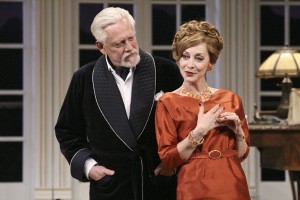 Noël Coward referred to his final play, A Song at Twilight, as his “swan song.” The last installment of his Suite in Three Keys (a trio of plays set in the same hotel suite in Switzerland) opened in London in 1966 starring Mr. Coward alongside stage legends Lilli Palmer and Irene Worth. Now, The Pasadena Playhouse is attempting to breathe new life into this rarely performed gem with an all-star cast featuring Bruce Davison (Sir Hugo), Sharon Lawrence (Carlotta) and Roxanne Hart (Hilde). Devoid of the caustic wit and cutting sarcasm that was Mr. Coward’s trademark, the revival unfortunately arrives’”in no small part due to the miscasting or misdirecting of Mr. Davison’”on life support.
Noël Coward referred to his final play, A Song at Twilight, as his “swan song.” The last installment of his Suite in Three Keys (a trio of plays set in the same hotel suite in Switzerland) opened in London in 1966 starring Mr. Coward alongside stage legends Lilli Palmer and Irene Worth. Now, The Pasadena Playhouse is attempting to breathe new life into this rarely performed gem with an all-star cast featuring Bruce Davison (Sir Hugo), Sharon Lawrence (Carlotta) and Roxanne Hart (Hilde). Devoid of the caustic wit and cutting sarcasm that was Mr. Coward’s trademark, the revival unfortunately arrives’”in no small part due to the miscasting or misdirecting of Mr. Davison’”on life support.
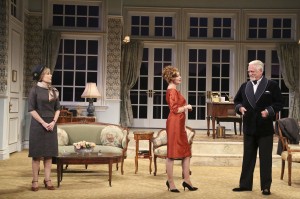 While the story, which tells the tale of a famous but closeted author who is paid a visit by his former mistress and forced to confront the regrets of his life choices, was inspired by Lord David Cecil’s biography of Max Beerbohm, it was thought Mr. Coward based both his portrayal and the character of Sir Hugo on author Somerset Maugham (in fact his stage makeup was said to have an “uncanny” resemblance to the author). Mr. Coward had danced around gay themes in the past but never as blatantly: a brave act considering it hit the boards in the West End a year before England decriminalized homosexuality. (For historical reference: The American Psychiatric Association didn’t declassify “the love that dare not speak its name” as a mental disease until 1973, and gay sex remained illegal in 13 states until the Supreme Court threw out the sodomy laws in 2003.)
While the story, which tells the tale of a famous but closeted author who is paid a visit by his former mistress and forced to confront the regrets of his life choices, was inspired by Lord David Cecil’s biography of Max Beerbohm, it was thought Mr. Coward based both his portrayal and the character of Sir Hugo on author Somerset Maugham (in fact his stage makeup was said to have an “uncanny” resemblance to the author). Mr. Coward had danced around gay themes in the past but never as blatantly: a brave act considering it hit the boards in the West End a year before England decriminalized homosexuality. (For historical reference: The American Psychiatric Association didn’t declassify “the love that dare not speak its name” as a mental disease until 1973, and gay sex remained illegal in 13 states until the Supreme Court threw out the sodomy laws in 2003.)
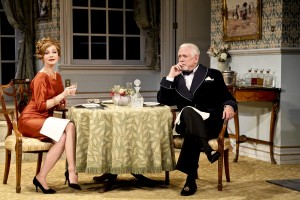 Many “Poofsters” of the time avoided prosecution and persecution and gained acceptance by adopting the traits and attributes of the effete and effeminate socially elite. They weren’t gay; they were aristocrats hiding behind the façade of heterosexuality with sham marriages and well-publicized affairs. To endear themselves to the masses and to masque their own unhappiness, many combined their socially acceptable flamboyant persona with biting humor and acerbic bitchery. Mr. Coward was the king of such behavior and his oft quoted quips were beloved.
Many “Poofsters” of the time avoided prosecution and persecution and gained acceptance by adopting the traits and attributes of the effete and effeminate socially elite. They weren’t gay; they were aristocrats hiding behind the façade of heterosexuality with sham marriages and well-publicized affairs. To endear themselves to the masses and to masque their own unhappiness, many combined their socially acceptable flamboyant persona with biting humor and acerbic bitchery. Mr. Coward was the king of such behavior and his oft quoted quips were beloved.
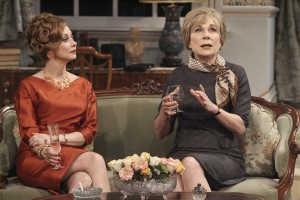 The script is laced with abundant examples of these frothy, droll, and self-effacing observations, but Mr. Davison somehow manages to miss them all. He simply acts angry. No subtext. No wit. No edge. He plays Sir Hugo like a grouchy old man’”period. This approach does not give Ms. Lawrence or Ms. Hart much to work with, although they at least are giving it their all and appear to get the inherent humor of the piece. The show only truly comes alive when the women get to interact with each other; since they share the stage for less than a quarter of the two-hour-plus running time, that leaves a lot of dead space. The effect of any of the lines that do land when conversing with Mr. Davison is quickly negated as they are sucked into his life-draining curmudgeonly abyss. I don’t know what director Art Manke was thinking. Rounding out the cast is Zach Bandler as the room service waiter Felix. He has very little to do but makes the most of his stage time and is quite charming in the role.
The script is laced with abundant examples of these frothy, droll, and self-effacing observations, but Mr. Davison somehow manages to miss them all. He simply acts angry. No subtext. No wit. No edge. He plays Sir Hugo like a grouchy old man’”period. This approach does not give Ms. Lawrence or Ms. Hart much to work with, although they at least are giving it their all and appear to get the inherent humor of the piece. The show only truly comes alive when the women get to interact with each other; since they share the stage for less than a quarter of the two-hour-plus running time, that leaves a lot of dead space. The effect of any of the lines that do land when conversing with Mr. Davison is quickly negated as they are sucked into his life-draining curmudgeonly abyss. I don’t know what director Art Manke was thinking. Rounding out the cast is Zach Bandler as the room service waiter Felix. He has very little to do but makes the most of his stage time and is quite charming in the role.
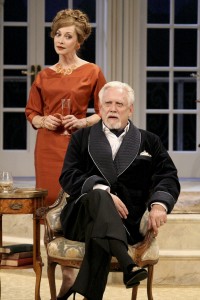 The scenic design by Tom Buderwitz is very elegant but for some reason the set extends past the proscenium making no effort to cover or conceal the ornate carving in the arch around the stage. It looks like a mistake and would have been much less distracting if he had scaled it down and kept the entire set behind the opening. He has also placed a number of wall sconces unusually high. Had I not been so bored I would probably not have noticed their positioning but I was and I did. The lighting, sound, and costumes are all adequate but nothing special.
The scenic design by Tom Buderwitz is very elegant but for some reason the set extends past the proscenium making no effort to cover or conceal the ornate carving in the arch around the stage. It looks like a mistake and would have been much less distracting if he had scaled it down and kept the entire set behind the opening. He has also placed a number of wall sconces unusually high. Had I not been so bored I would probably not have noticed their positioning but I was and I did. The lighting, sound, and costumes are all adequate but nothing special.
Director Manke has seven Coward plays under his belt (including the Playhouse’s Fallen Angels last season) and was dubbed “L.A.’s Coward specialist” by the Los Angeles Times. After sitting through this misguided effort I think it would be wise to seek a second opinion.
photos by Michael Lamont
A Song at Twilight
Pasadena Playhouse
39 S. El Molino Avenue in Pasadena
scheduled to end on April 13, 2014
for tickets, call 626-356-7529 or visit www.PasadenaPlayhouse.org

{ 7 comments… read them below or add one }
You have absolutely no idea what you are talking about and it’s obvious you don’t know anything about this play. Coward’s own notations throughout the entire script call for Hugo Latimer to be “angry” or “furious” or “near hysteria” or “agitated.” He is never described as anything else. Why don’t you actually do your research and read the play before you make idiotic comments about someone’s performance or directing? Even better, try reading the LA Times once in a while so you can learn something.
Being that yours is the only negative review in a sea of extraordinarily positive ones, all praising the casting, directing, acting, and set design, maybe it’s time, Mr Chaits, to take a look at the origin of your own anger and boredom issues? I saw the play last week and 100% agree with the rave reviews and find your review odd and a little too personally revealing. Kudos to Debra Aquilla for her brilliant casting.
Your review is an embarrassment. You’ve mistaken Noel Coward’s public persona with a character he created. Then you’ve lambasted an actor for not fulfilling your totally mistaken expectations. Sir Hugo is not Sir Noel and “A Song at Twilight” is not a comedy, though you seem to wish it were. Mr. Manke is indeed a Coward specialist, rare out here, and we’re lucky to have him. One can only hope that uncomprehending work like yours won’t scare him off. As for your petulant comments about the wall sconces, few things are more embarrassing than faux sophistication. And there’s more to being a critic than doing an imitation of Clifton Webb in “Laura.” This website, and L.A. theatregoers, deserve better.
I am wondering how this production compares with the 2010 Odyssey theatre production a couple of years ago that starred conservative firebrand/anti-gay marriage advocate Orson Bean (and his wife Alley Mills). I wasn’t aware of Bean’s activism against gay marriage until after seeing the play. I am guessing Mr. Bean felt that the old queen should have left the gay life behind after all.
I must say I concur to some degree with Mr. Chaits, although Mr. Davison’s performance was not the anchor that stalled this production as much as the lack of balance in the forces of tension among the three characters, more the responsibility of the director in this case. Too much bludgeoning instead of smart rapier repartee made the experience feel more Albee than Coward to this viewer, yet the material couldn’t sustain the weight of blunt force subjected by this approach. I kept wishing that a British sensibility (British actors included) could have leavened the mordancy somewhat and found more the ironic humor that was left unmined in this production.
I would tend to agree with dp. While Jennifer’s comments about Coward’s notations may be accurate, (I have no way to verify that) to watch Mr. Davison play a one note performance throughout, I found quite tedious. The character has no arc and no subtleties and if that’s what Coward wanted, well, it was tiresome to watch. For me it would have been much more entertaining if in Act I Hugo was much more of Carlotta’s equal in parrying and thrusting with her comments, rather than just blustering and getting red-faced. Then when she drops the bomb at the end of Act I, his turn to fury and upset in Act II would have been much more impactful (and understandable.) If Hugo’s last moment alone is the sum of his arc, I found it to be too little too late.
You and dp are entitled to dislike the play, but please know this is the way it was written and the way it was meant to be performed. It’s not a Coward comedy filled with clever patter. He also wrote any number of dramas, many of them in his omnibus of plays “Tonight at 8:30,” and “A Song at Twilight” is the last of them. It seems a shame that you may have been misled by this ignorant, poorly thought out review. (And, not that it should change your opinions, but almost all of the other reviews for this show have been highly favorable.)